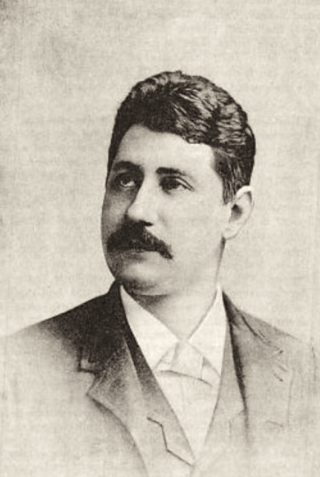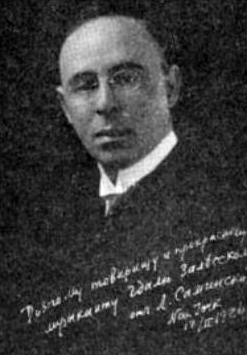Related Research Articles
Maryland is a U.S. state with a musical heritage that dates back to the Native Americans of the region and includes contributions to colonial era music, modern American popular and folk music. The music of Maryland includes a number of popular musicians, folk styles and a documented music history that dates to the colonial archives on music from Annapolis, an important source in research on colonial music. Famous modern musicians from Maryland range from jazz singer Billie Holiday to pop punk band Good Charlotte, and include a wide array of popular styles.

Ner Israel Rabbinical College, also known as NIRC and Ner Yisroel, is a Haredi yeshiva in Pikesville, Maryland. It was founded in 1933 by Rabbi Yaakov Yitzchok Ruderman, a disciple of Rabbi Nosson Tzvi Finkel, dean of the Slabodka yeshiva in Lithuania. Rabbi Aharon Feldman, a disciple of Rabbi Ruderman and a member of the Moetzes Gedolei HaTorah of America, became its head in 2001.

David Conte is an American composer who has written over 150 works published by E.C. Schirmer, including six operas, a musical, works for chorus, solo voice, orchestra, chamber music, organ, piano, guitar, and harp. Conte has received commissions from Chanticleer, the San Francisco Symphony Chorus, Harvard University Chorus, the Men’s Glee Clubs of Cornell University and the University of Notre Dame, GALA Choruses from the cities of San Francisco, New York, Boston, Atlanta, Seattle, and Washington, D.C., the Dayton Philharmonic, the Oakland Symphony, the Stockton Symphony, the Atlantic Classical Orchestra, the American Guild of Organists, Sonoma City Opera, and the Gerbode Foundation. He was honored with the American Choral Directors Association (ACDA) Brock Commission in 2007 for his work The Nine Muses, and in 2016 he won the National Association of Teachers of Singing (NATS) Art Song Composition Award for his work American Death Ballads.
The music of Baltimore, the largest city in Maryland, can be documented as far back as 1784, and the city has become a regional center for Western classical music and jazz. Early Baltimore was home to popular opera and musical theatre, and an important part of the music of Maryland, while the city also hosted several major music publishing firms until well into the 19th century, when Baltimore also saw the rise of native musical instrument manufacturing, specifically pianos and woodwind instruments. African American music existed in Baltimore during the colonial era, and the city was home to vibrant black musical life by the 1860s. Baltimore's African American heritage to the start of the 20th century included ragtime and gospel music. By the end of that century, Baltimore jazz had become a well-recognized scene among jazz fans, and produced a number of local performers to gain national reputations. The city was a major stop on the African American East Coast touring circuit, and it remains a popular regional draw for live performances. Baltimore has produced a wide range of modern rock, punk and metal bands and several indie labels catering to a variety of audiences.

Hugo David Weisgall was an American composer and conductor, known chiefly for his opera and vocal music compositions.
Rabbi Isaac Elchanan Theological Seminary is the rabbinical seminary of Yeshiva University (YU). It is located along Amsterdam Avenue in the Washington Heights neighborhood of Manhattan, New York City.
Chen Yi is a Chinese-American composer of contemporary classical music and violinist. She was the first Chinese woman to receive a Master of Arts (M.A.) in music composition from the Central Conservatory of Music in Beijing. Chen was a finalist for the 2006 Pulitzer Prize for Music for her composition Si Ji, and has received awards from the Koussevistky Music Foundation and American Academy of Arts and Letters, as well as fellowships from the Guggenheim Foundation and the National Endowment for the Arts. In 2010, she was awarded an Honorary Doctorate from The New School and in 2012, she was awarded the Brock Commission from the American Choral Directors Association. She was elected to the American Academy of Arts and Letters in 2019.
Michael Nathaniel Hersch is an American composer and pianist. He currently serves as faculty at the Johns Hopkins Peabody Conservatory in Baltimore, Maryland, where he completed his own studies in music composition. The New York Times has commented that he writes "extraordinarily communicative music" and that "Mr. Hersch's music speaks for itself eloquently".

Stephen Paulus was an American Grammy Award winning composer, best known for his operas and choral music. His style is essentially tonal, and melodic and romantic by nature.

Diran Alexanian was an Armenian cello teacher and one of the world's greatest virtuoso cellists.

Max Spicker was a German American organist, conductor and composer.

Shmuel Yaakov Weinberg, known as Yaakov Weinberg was an Orthodox Jewish rabbi, Talmudist, and rosh yeshiva (dean) of Ner Israel Rabbinical College in Baltimore, Maryland, one of the major American non-Hasidic yeshivas. Weinberg was also a rabbinical advisor and board member in Haredi and Orthodox institutions such as Torah Umesorah, Agudath Israel of America and the Association for Jewish Outreach Programs.

Samuel "Sem" Dresden was a Dutch conductor, composer, and teacher.
Grant Gershon is a Grammy Award winning American conductor and pianist. He is Artistic Director of the Los Angeles Master Chorale, formerly Resident Conductor of the Los Angeles Opera, member of the Board of Councillors for the USC Thornton School of Music and a former member of the Chorus America Board of Directors.
Paul Alan Levi is an American composer whose compositions have been performed in Carnegie Hall, among other major venues in United States and Europe, as well as on national television. He is the composer of the 1971-1984 PBS identity music.

Lazare Saminsky (born Lazar Semyonovich Saminsky was a performer, conductor and composer, especially of Jewish music.
Igor Konstantin Buketoff was an American conductor, arranger and teacher. He had a special affinity with Russian classical music and with Sergei Rachmaninoff in particular. He also strongly promoted British contemporary music, and new music in general.
Hanus Aldo Schimmerling (1900–1967), pianist, composer, teacher, musicologist, and writer, known professionally as Hanns Aldo Schimmerling, was born to Hugo Schimmerling, a dentist, and Eugenie (Jennie) Grossman in Brno, the capital of Moravia in the Czech Republic. Both parents, in their sixties, fell victims to the Holocaust in 1944.
John Barry Talley is a musical director at the United States Naval Academy.
Jake Runestad is an American composer and conductor of classical music based in Minneapolis, Minnesota. He has composed music for a wide variety of musical genres and ensembles, but has achieved greatest acclaim for his work in the genres of opera, orchestral music, choral music, and wind ensemble. One of his principal collaborators for musical texts has been Todd Boss.
References
- 1 2 3 4 5 6 7 8 9 10 11 12 Hevesi, Dennis. "Rabbi Moshe Cotel, Composer, Dies at 65", The New York Times , November 2, 2008. Accessed November 3, 2008.
- 1 2 Schultz, Rick. "The ‘Chronicles’ of the musical rabbi", The Jewish Journal of Greater Los Angeles , June 12, 2008. Accessed November 3, 2008.
- ↑ "Rabbi Moshe (Morris) Cotel's Obituary on New York Times". New York Times. Retrieved 2018-07-26.
- 1 2 3 Staff. "Moshe Cotel, Musician And Rabbi, 65", The Jewish Week , October 29, 2008. Accessed November 3, 2008.
- ↑ Hughes, Allen. "Music: Cotel's Virtuosity", The New York Times , October 13, 1977. Accessed November 3, 2008.
- ↑ Administrator. "Moshe Cotel - Opera". www.moshecotel.com. Retrieved 2018-07-26.
- ↑ Hargreaves, David; Miell, Dorothy; MacDonald, Raymond, eds. (2012). Musical Imaginations: Multidisciplinary Perspectives on Creativity. Oxford University Press. p. 116. ISBN 9780199568086.
- 1 2 Administrator. "Moshe Cotel - Choral". moshecotel.com. Retrieved 2018-07-26.